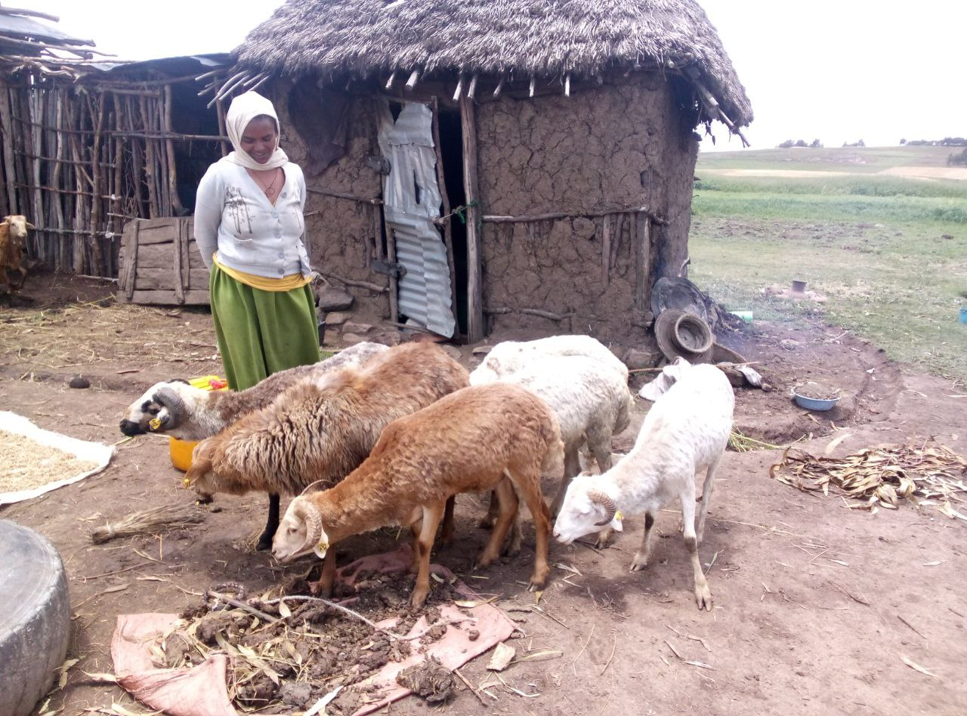Though it is a bit an early stage to determine the viability of these small business models and a thorough cost-benefit analysis has not yet been performed, those involved in sheep-fattening activities have already started to reap some promising benefits in a time span of less than three months.
The baseline and Rapid Food System Appraisal (RFSA) conducted in the food-insecure woreda of Angot, North Wello Zone, revealed the existence of significant challenges pertaining to joblessness, limited livelihood alternatives for sustenance, and restricted access to finance, particularly for women and youth. In areas where land is scarce and the available land is degraded and frequently affected by frost, hail, and drought, such problems become notably severe.
In order to address these demanding challenges, RAISE-FS and Sirinka Agricultural Research Centre (ARC) are piloting a small business model that centres around poultry production and sheep fattening activities in Angot woreda. The activities started in 2022 and are currently being implemented in close collaboration with Bisrat Union, Angot Woreda Cooperative Promotion Office, Woreda Livestock Agency, and Rural Saving and Credit Cooperatives (RuSACCOs) of Koso Amba and Eshet Amba kebeles.
In executing this endeavour, a formal agreement was entered into with Bisrat Union on establishing a guarantee fund scheme in conformity with the credit modality of the union. In accordance with their established practice, the union extends a loan to their cooperative members, amounting to threefold the sum saved, with an interest rate of 12 percent. Following the same guiding principles, the cooperatives then offer credit to their selected members at a 15 percent interest rate in kind.
After taking this in-kind credit, 30 farmers in Angot woreda engaged in sheep fattening and poultry production endeavors. Twelve youths, consisting of 4 females and 8 males, have each received six or seven sheep for fattening, and additionally, 18 youths, consisting of 12 females and 6 males, have each received 50 chickens. Participant farmers were trained in poultry production and sheep fattening before receiving the chickens and sheep as in-kind credit. The idea behind in-kind credit is to facilitate efficient loan utilisation while providing technical support to farmers involved in sheep fattening and small-scale poultry business models.
Mr Alebachew Tsegaw, a chairperson of Koso Amba RuSACCO, said, “The small business model has created job opportunities and benefited some young and smallholder farmers in the kebele. The agroecology of the area is conducive to sheep-fattening activities. Farmers did not face feed scarcity this year because of ample rainfall. They could have gained even better results if the fattening activity had begun earlier. Most farmers have decided to purchase sheep for the next round of the fattening cycle. Only the farmers who unknowingly purchased sheep at high prices made a small profit.” Mr Alebachew continued, “In light of this experience, some farmers request that we become cooperative members.” This shows that the activity plays a role in encouraging youth and women to be members of the cooperative.
Nigussie Seyoum, who is a researcher in Sirinka ARC and the centre representative for the RAISE-FS team, pointed out that the research centre selected the Awassi sheep breed and Sasso chicken varieties based on the agro-ecology of the area and facilitated the linkage with poultry out growers and coordinated the sheep procurement process with the support of professionals.
He noted: “Despite initial challenges, including a delayed start than anticipated time for various reasons and limited follow-up because of the security situation, the results are encouraging. We haven’t yet conducted a profitability analysis, but we can tell from farmers’ feedback that the pilot program is heading in the right direction. Some farmers sold sheep for the new year and reaped profits of up to 20,000 ETB from the first-round fattening.’ Negussie further added that the poultry production activity is also progressing well.

In the efforts to kick-start the guarantee fund activity, back-and-forth discussions have been made with Bisrat Union in the zone and two saving cooperatives and a cooperative promotion office at the woreda with the facilitation of RAISE-FS and Sirinka ARC. Although it takes time to bring all stakeholders on board, one key takeaway from the activity is that it brings all the relevant actors together to create jobs for the jobless and improve the income of youth and women in the food-insecure area. The small-business model, through guarantee fund activity, improved the relationship between members and the cooperatives.
